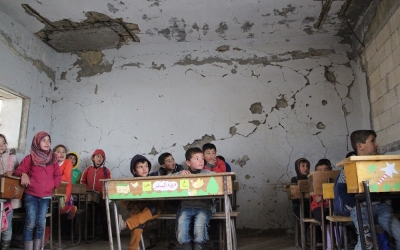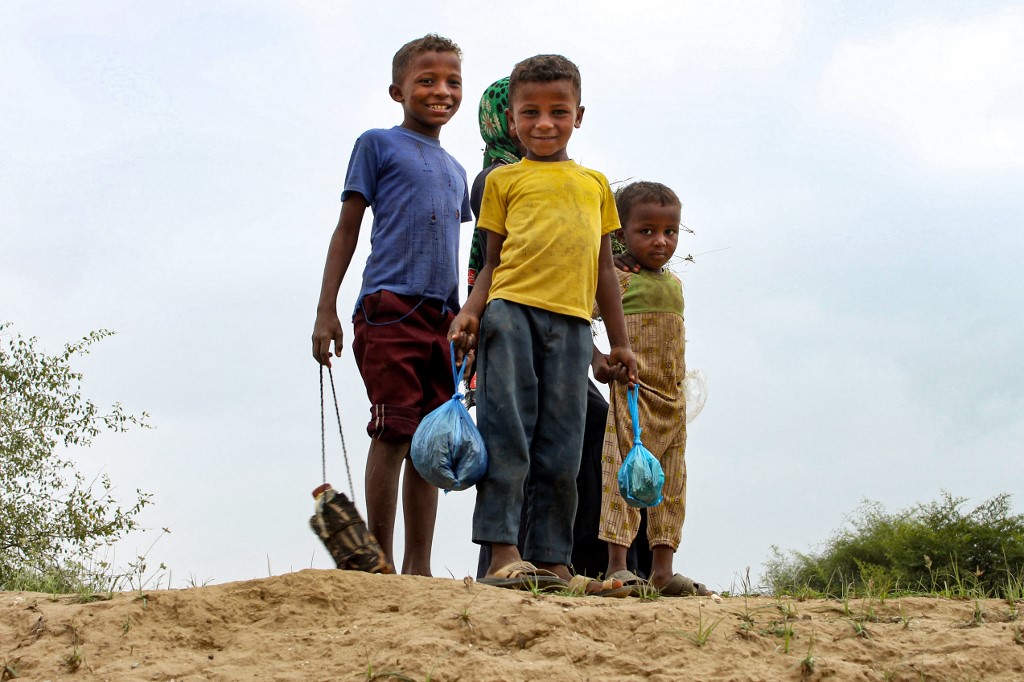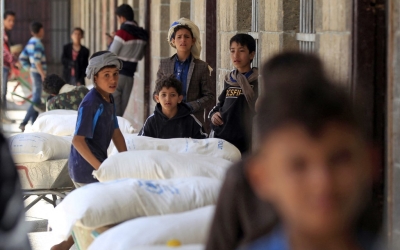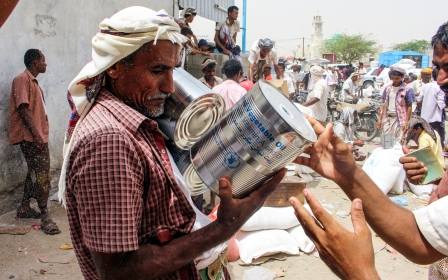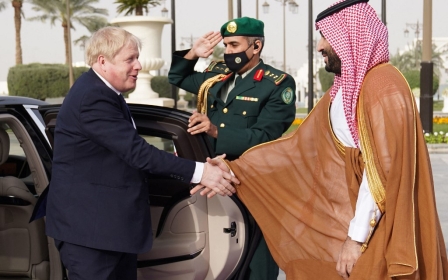UK Labour Party is embracing Tories' cynical cruelty on foreign aid

Look, we get it. There's a UK election on the way and despite terrible polling for the governing Conservatives, the opposition Labour Party has a mountain to climb to overturn a huge parliamentary majority.
But we can all agree that selling out the poorest people in the world to nab a few votes from the right is pretty low, right?
Labour's reported U-turn on reinstating the Department for International Development (DfID) continues the Tory tendency to sacrifice economic justice for political or market efficiency - ending up with neither.
Keeping the distribution of UK aid money under the purview of the Foreign, Commonwealth and Development Office (FCDO) - where it can be used to further foreign policy political agendas, as compared with the development needs of desperate nations - undermines Britain's global credibility as a reliable and objective funder of development, let alone any pretensions it may have to being a moral leader.
Britain's international development policy, as in many UK government agencies tasked with actually getting things done, has been in turmoil over the past three years of political chaos in Westminster. But for 20 years or so after its inception, by Tony Blair's Labour in the wake of their 1997 electoral landslide, DfID was truly world leading.
New MEE newsletter: Jerusalem Dispatch
Sign up to get the latest insights and analysis on Israel-Palestine, alongside Turkey Unpacked and other MEE newsletters
Its Girls Education Challenge was the world's largest fund dedicated solely to girls' schooling in the most impoverished countries. DfID was also a major funder of the Global Partnership for Education and the Education Cannot Wait fund.
Millions of children have been able to attend school because of DfID's funding. Meanwhile, more than 20 million women and girls a year were supported with modern methods of family planning thanks to DfID-supported programmes.
Global stability
DfID was a dependable supplier of humanitarian assistance in international crises. In Yemen, DfID-supported humanitarian programmes reached 7.6 million people between 2015 and 2019. It also vaccinated 400 million children a year against polio and contributed hugely to making Africa free of wild polio.
Even under the Conservatives, the department was widely respected. DfID Minister of State Alistair Burt's private briefings to senior journalists were candid, insightful and apolitical - something all too rare in the years of culture wars which have followed.
But too often, overseas aid is seen as charity instead of a long-term investment in global stability and national security. As prime minister, Boris Johnson scrapped the department, calling aid money a "giant cashpoint in the sky that arrives without any reference to UK interest".
Its remit was brought under a newly renamed Foreign, Commonwealth and Development Office and its budget was slashed from an internationally agreed 0.7 percent of gross national income (GNI) to 0.5 percent.
The cut meant a reduction in aid spending of nearly 30 percent - a real-terms cut of £4bn that is no longer going to build hospitals, or counter extremism through education.
And the Labour Party, which will almost certainly be in power in the UK after the next election, has not only seemingly abandoned its year-old pledge to reinstate the department - with Shadow Foreign Secretary David Lammy leading the argument for the establishment of a new overseas development agency within the FCDO, as was the case before 1997 - it has also failed to commit to reinstating the 0.7 percent spending level.
A spokesperson described it as a "target", using the weasel words "as soon as the fiscal environment allows" in an attempt to fudge any sort of timeline.
Total disarray
The management efficiencies that were touted as part of the DfID-FCDO merger have also failed to materialise. The restructuring has caused problems for, among others, the Independent Commission for Aid Impact (ICAI), the aid watchdog, which said a review had attempted to compromise its independence.
Its latest annual report offers a glimpse of a department in total disarray: "[W]e have faced greater challenges in accessing information, carrying out our country visits, dealing with a continually changing cast of interlocutors, and having to use FCDO's IT, finance and HR systems which have been dysfunctional for most of the time," agency chief Tamsyn Barton wrote.
"In the cases where we finally succeeded in recruiting staff, some gave up waiting for the contracts to be issued. And as for the finance, we have had to wait until June for clarity on our budget in the same financial year, and were unable to pay temporary staff or our contractors for several weeks."
It's absurd. The UK Treasury appears to be making it up as it goes along, using the aid budget to plug gaps that appear elsewhere due to a lack of planning, forethought or competence.
The Treasury appears to be making it up as it goes along, using the aid budget to plug gaps that appear elsewhere due to a lack of planning, forethought or competence
It was revealed last month that the UK government is designating the spending on hotels accommodating asylum seekers in this country as overseas development spending, counting towards its 0.5 percent target. These are bills run up by the Home Office and its vicious ideology around immigration, and charged to the aid budget's credit card in the hope no one would notice.
There are about 37,000 asylum seekers in hotels in the UK, at a cost to the aid budget of £2bn a year - nearly a fifth of the total overseas aid budget. Of course, the hotel bills also include VAT - payments from the aid budget which go to hotels, which are then passed back in tax to the Treasury.
Likewise, Save the Children has warned that overseas aid projects will be slashed because the Treasury has also decided to include spending on the UK's 100,000 Ukrainian refugees within the reduced aid budget. It's thought that spending - while welcome, necessary and commendable - will reach a further £3bn.
So that's half the budget gone, spent on things deemed domestically politically expedient, without any overseas projects getting a look-in.
Cruel and unlawful plans
The leaps towards transparency taken by DfID have been muddied by its merger with the FCDO. There is now little in place to ensure that aid isn't used to bribe or reward governments which ally themselves with UK foreign policy and the quiet whisperings of British diplomats.
Politicising aid spending undermines Britain's standing on the world stage and plays games with the lives of desperate people. You might expect that by now from the Conservatives, but Labour claims to be the voice of the poor, the vulnerable, the exploited, and it's not unreasonable to expect half an ounce of moral leadership.
It's not the only Tory policy to be quietly folded into Labour's platform. On immigration, Labour is only attacking the Conservatives from the right, lambasting them not for their cruel (and unlawful) plans, but for failing to implement them.
Labour will also keep the Conservatives' two-child limit on child benefits paid by the public purse, a policy described as "Made in China" by Scottish National Party leader Stephen Glynn.
The UK wants to see itself as a humanitarian leader. It remains the third-largest bilateral humanitarian donor in the world. We still spend £10bn a year, split between improving global health, fighting poverty and tackling climate change - much to the chagrin of some on Facebook posting memes decrying the amount spent overseas while child poverty in the UK is increasing.
While we spend £10bn a year on overseas development aid, we spend £32bn on our military and £81bn on education. Just paying the interest on the national debt will cost us £94bn this year.
The Labour Party knows it can't enact its agenda without being in power. But in stripping so much of its progressive agenda in order to win, it's no longer clear how markedly different a Labour government would be from this disastrous Conservative one.
The views expressed in this article belong to the author and do not necessarily reflect the editorial policy of Middle East Eye.
Middle East Eye delivers independent and unrivalled coverage and analysis of the Middle East, North Africa and beyond. To learn more about republishing this content and the associated fees, please fill out this form. More about MEE can be found here.



